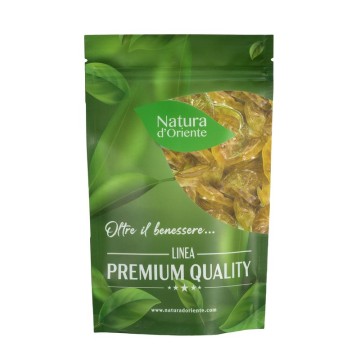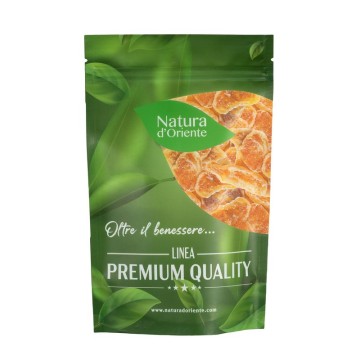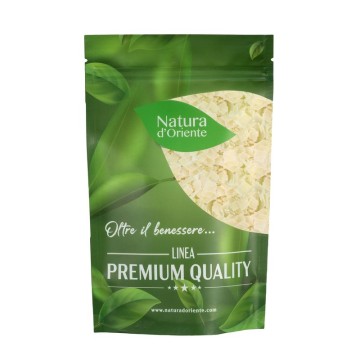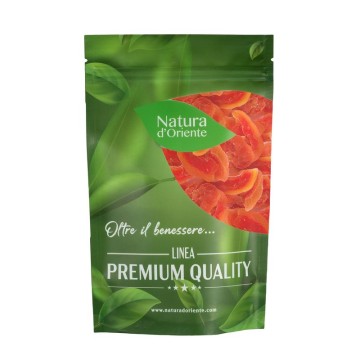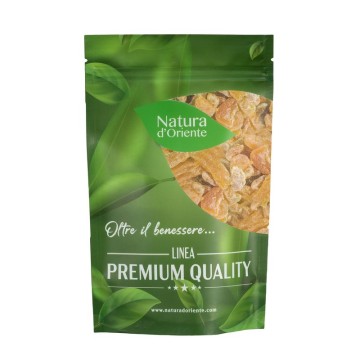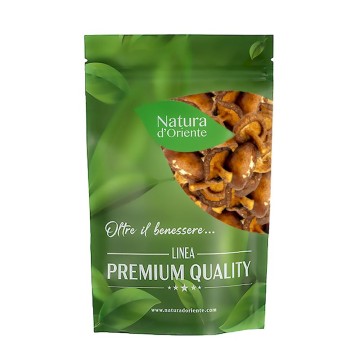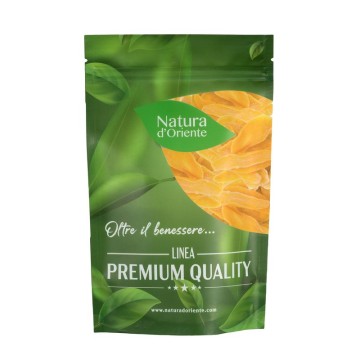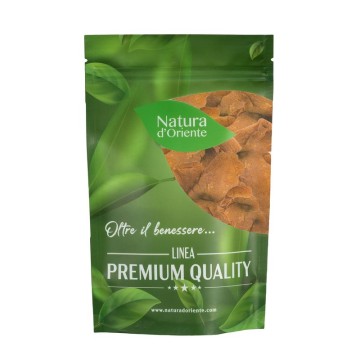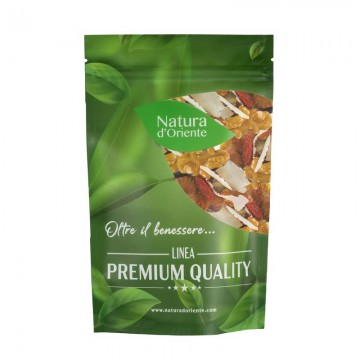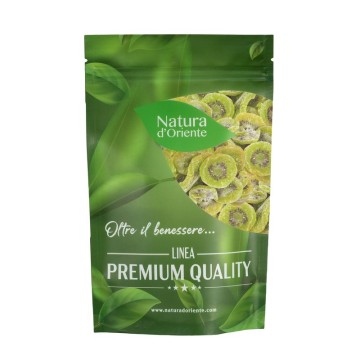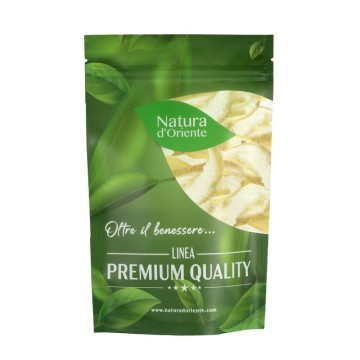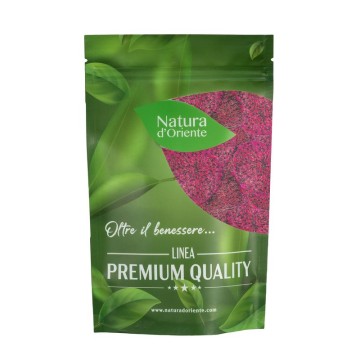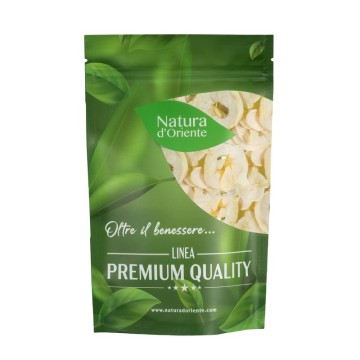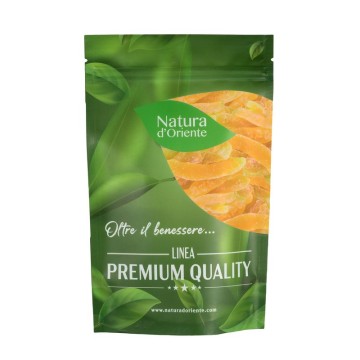Natural dehydrated cinnamon ginger
The root of this plant, or rather its underground rhizome, has been known for centuries for its intense flavor and health benefits. Ginger is available today in the form of powder, dried ginger slices, ginger flavoring for ginger drink, and so on.
Also in the dehydrated version with the addition of exquisite aromas and flavors, as in this version of natural cinnamon ginger to amplify the properties and aromas of the two ingredients.
Dried ginger with cinnamon: properties and benefits
Oriental medicine used this root for its natural anti-inflammatory, digestive, and anti-nausea and anti-dizziness properties. In some cases, ginger was also considered an aphrodisiac.
Today, however, ginger is known to most as a food that can bring benefits to digestion, and relieve colds and sore throats. It is used in herbal teas to calm the symptoms of hoarseness and rhinitis, in fact.
The active ingredients of the root allow these healthy benefits , and are those concentrated in the rhizome: gingerols, shogaoli, as well as some resins and mucilages.
The pungent flavor derives from these polyphenols, gingerols and shogaols , responsible for the antioxidant and anti-nausea properties of natural ginger.
Among the other properties of the spice, there is that of protecting the gastric mucosa, promoting proper digestion, counteracting harmful bacterial fermentation, and helping the elimination of gases.
Natural ginger stimulates gastrointestinal functions, and provides various anti-emetic properties. It is good for limiting stomach pain and motion sickness - symptoms such as dizziness, nausea and regurgitation). In addition, the intake of ginger helps to counteract the symptoms of esophageal reflux .
These properties are useful in association with cinnamon, when the dehydrated natural ginger takes on the aroma of this spice.
Ginger and cinnamon give an intense taste, an even more enveloping scent, and unique in its sweet and spicy nuances. It enhances the warming effect of ginger, especially useful against colds, and that of its excellent digestive properties (both act on the gastrointestinal level).
Natural dehydrated ginger with cinnamon, so it is a delight that also helps against halitosis , promoting a fresh and aromatic breath. Dried ginger has antioxidant properties, mainly due to gingerol, able to counteract the oxidation of cells, their aging and damage.
Thanks to antioxidants, an enzyme is created in the body that inhibits the harmful action of free radicals with an effect considered even stronger than vitamin E. In the dehydrated version, the concentration of polyphenols acts optimally as an antioxidant.
Ginger is also known as a beneficial food for the cardiovascular system, since gingerol and volatile oils can have a beneficial effect on the protection of the vascular system.
Origins and History of cultivation
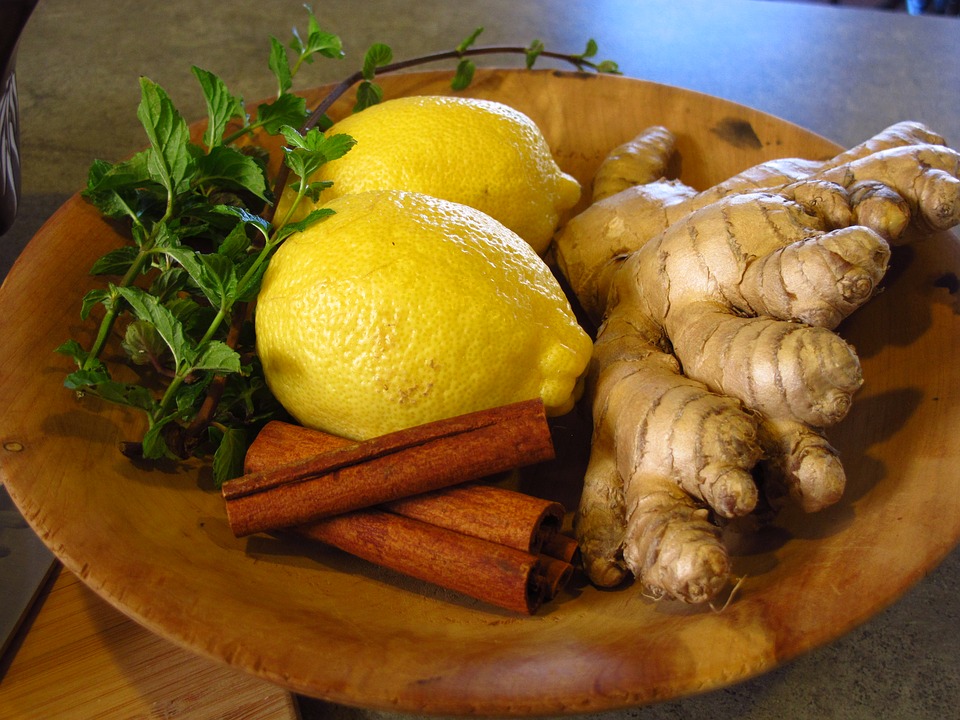 Ginger is a perennial plant, native to tropical Asia, therefore from the East. From its rhizome, the underground part that is erroneously defined as the root, we get the spicy spice of ginger, known since ancient times.
Ginger is a perennial plant, native to tropical Asia, therefore from the East. From its rhizome, the underground part that is erroneously defined as the root, we get the spicy spice of ginger, known since ancient times.
Already Confucius used ginger (5th century BC) in ancient China, and in Chinese medicine it was a hot element, to fight the cold and rebalance the body.
It was also considered an important food by Greeks and Romans, and the doctor Dioscorides Pedanio (1st century AD) recommended it to warm and calm the stomach. Among the Arab peoples, ginger was known as an energizer and aphrodisiac.
Ginger in the Middle Ages was defined as "gengevo" (hence the English gingifer and the current ginger), a precious spice that reached the Americas in the sixteenth century thanks to the Spaniards. It began to spread all over the world, where many populations knew its properties as a food preservative. Due to such food preservation capacities, it was considered in some cases a magical food.
In Asian and Indian cuisine it was used to perfume sweet and savory dishes, and in the West today it is used a lot in powdered versions for first and second courses, drinks, cocktails. Slices of dehydrated ginger, with or without sugar, are also very popular.
The plant is grown today throughout the tropical and subtropical belt, and the rhizome is extracted and cleaned when you want to use fresh gingerco. Alternatively, it is dehydrated to obtain sun-dried ginger, made into a powder and sold as a spice.
On the market, therefore, ginger is found in the form of fresh or dried root, powdered or extracted; otherwise, like candied ginger using natural sugar.
From fresh it can become dehydrated natural ginger sliced, diced, ground or candied. It is often dehydrated without added sugar and can be flavored with other spices, such as the cinnamon version of dehydrated natural ginger.
Plant and Fruit
The evergreen herbaceous plant Zingiber officinale is part of the Zingiberaceae family, and was born in the tropical Far East; it probably originated wild in Malaysia.
It is a plant with a fleshy and branched rhizome (underground shoot).
Hollow stems and other stems with yellow-green inflorescences are born from the rhizome; in addition to the flowers, small and white.
In terms of size, ginger bushes expand to up to half a meter in width and similar in height.
The plant can be grown indoors or in home gardens, and in any case it grows well in warm climates, where temperatures do not drop below 5 ° C.
The fruit is woody and is not eaten, while the spice we know in our kitchens, or the dehydrated slices, with a spicy taste, are obtained from the rhizome. The rhizome is harvested when it has accumulated essential oil, in the cold season between January and February.
Nutritional values of natural dehydrated ginger
Ginger has a moderate caloric content, providing in the sliced dried version about 350 Kcal for every 100 grams. It is composed of natural sugars (about 60 g), zero fat, about 2% fiber.
In the essential oil there are the important active ingredients of ginger that make its pungent flavor, namely zingiberene, and the polyphenols gingerols and shogaols. Among these phenolic substances of natural ginger, dried 6-gingerol is transformed into 6-shogaol - object of study for its antioxidant properties.
Among other healthy substances, natural ginger contains about 5 mg of vitamin C per 100 grams, and good doses of vitamin B1 and vitamin B3.
How to consume dehydrated cinnamon ginger
The version of natural dehydrated ginger with cinnamon, has a pungent and intense flavor, with sweet notes from the combination of the two ingredients. It is appreciated as a satiating snack that leaves the palate feeling full.
In addition, this version of cinnamon-flavored dried ginger can flavor dishes such as soups, and for the decoration of desserts such as cakes or biscuits, cupcakes, muffins, ice creams, sorbets and semifreddo.
Slices of cinnamon ginger are also consumed as a snack to break hunger and energy, due to the sugars contained. It can be used to create energy bars suitable for those who practice sports, or for snacks to take with you.
Excellent to be inserted thinly in yogurt, smoothies, dried fruit and cereal mixes, where the hints of ginger and cinnamon blend with the most neutral ingredients.
Dehydrated ginger: side effects and contraindications
There are no specific warnings for taking natural ginger, but a possible intolerance to ginger itself, or to cinnamon, must be considered.
It is important not to exceed the doses of dehydrated ginger, as it can cause heartburn.
Due to the possible fluidifying properties, not definitively proven, it is not recommended to exceed in ginger for people who use anticoagulant drugs.
As with other dried and high-sugar foods, excessive use of dehydrated natural ginger is not recommended for people with diabetes. It should be used without exceeding, even during pregnancy or breastfeeding.









 No reward points for this product.
No reward points for this product.
 Ginger is a perennial plant, native to tropical Asia, therefore from the East. From its rhizome, the underground part that is erroneously defined as the root, we get the spicy spice of ginger, known since ancient times.
Ginger is a perennial plant, native to tropical Asia, therefore from the East. From its rhizome, the underground part that is erroneously defined as the root, we get the spicy spice of ginger, known since ancient times.